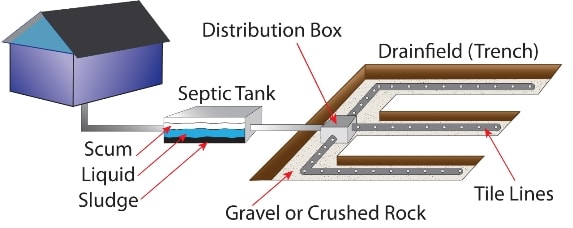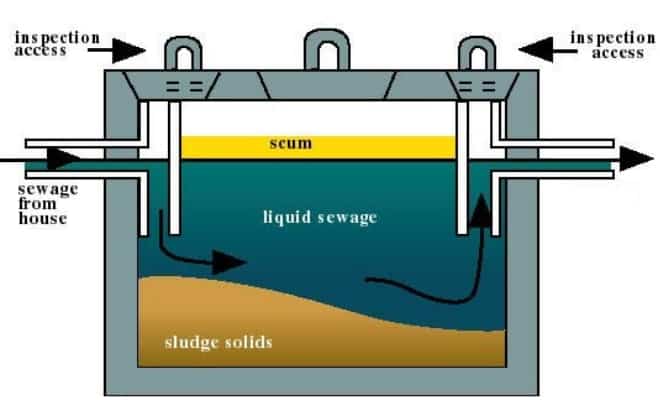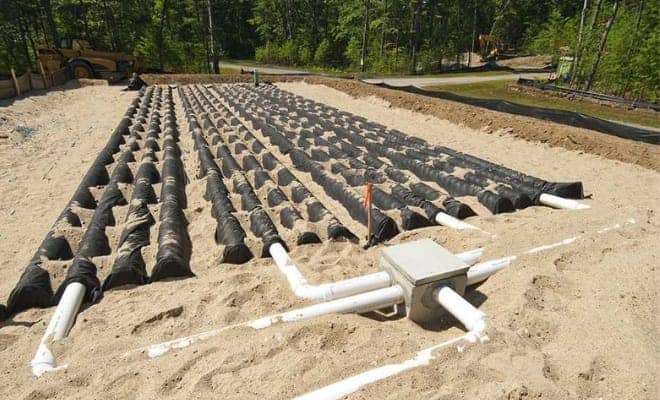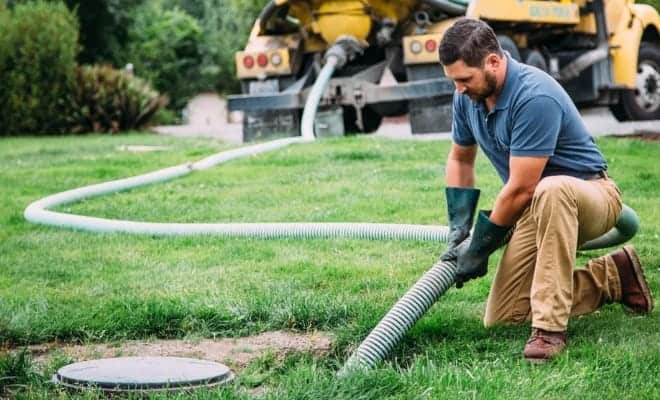Should I Buy a Home with an Old Septic System?

If you are looking to buy a home in a major city or a densely populated area, then chances are your home will be connected to a city managed waste system. Outside of those areas, it is likely that your home will have a septic system. Over 21 million homes in the United States have a septic system and most of them are functioning well.
Should I buy a home with an old septic system?
There is no reason not to buy a home with a septic system. If you have it inspected before the purchase and take the time to properly maintain it afterwards, you will likely have a septic system that will operate efficiently for decades.
*Your local realtor can be a great asset in helping to guide you through this process. He or she can help if you are buying a house with an old septic system.
When you are ready to buy, let us help you to find the best mortgage program and with the lowest rates possible.
How a Septic System Works
Septic systems really are nothing more than pipes and a storage tank with the eventual settling of liquid into the ground in your yard. Here is what happens:
- Liquid and solid waste exits your home via a waste pipe
- The waste then is dumped into a septic tank where the solids fall to the bottom and the liquid stays at the top
- The liquids will then flow to a pipe on the other side of the tank and will exit to a series of other pipes
- The other pipes arranged in a grid pattern will disperse the liquid throughout the yard into what is called the leach field.
- The leach field is beneath your lawn. It has crushed stone at the top and a special blend of soil, sand and sometimes stone called “bank run”
- Bank run is made so the liquids can effectively seep down well below the surface and dissipate into the earth.
Photo of What the Tank Looks Like on The Inside
Below is a photo of the entire system

Below is a photo of the drain field
How to Buy a Home with a Septic System
If you are shopping for a home in an area where septic systems are common, then you should be prepared to treat the septic system as its own entity. Be prepared to take this on and become fully educated on the process to avoid a costly mistake.
1.First, talk to the homeowner. Do this before even making an offer on the home and ask the following questions about the septic system:
- How often do you have the tank pumped?
- What septic tank company services your system?
- Ask to see documentation supporting the maintenance.
- Ask if the system is original or if it has ever been replaced and when.
2. Next, take a close look at the area around the septic tank. Do you smell an odor or is the ground very wet? These are initial signs that something is not functioning properly.
3. Hire a Septic Inspector – After you are in contract, you should hire an independent septic inspector that is different from the general home inspector. This may be a septic company that currently does not provide service to the home.
This is an added cost but will also help to identify anything that may be in need or repair. If the inspector believes the system needs to be replaced, they may be able to give you an estimate at that time which can help with the negotiations.
The age of the tank and the drain field should be an indicator as to how much longer the system will last.
4. Attend the septic inspection – This is something you absolutely should witness yourself. The inspector will likely try to load the system with water to see if it comes to the surface in your hard. He may add a dye which would make the water more visible.
Use this time to ask a lot of questions of the inspector. You may be able to get more from him during this time versus what you will see on a report.
Signs That a Septic System is Failing
These are just a few initial signs that your septic system is failing. If you are shopping for a home, you may be able to spot some of these things during our first visit.
- These are just a few things that you may notice if the system is failing

- There is an odor in the yard where the septic system is located
- Soggy yard and some puddles in the area of your septic system
- Some green colored surface masses in your lawn
- Your toilets and drains are backing up
Why Septic Systems Fail
There can be quite a few reasons why septic systems fail. In most instances, the homeowner has the ability to prevent the failure of the septic system. These are the primary factors that lead to failure:
- Poor system design
- Poor or no maintenance
- Inadequate soil conditions
- High water tables
- Old system components that have corroded
- Oils in the leach field blocking the water from draining
How to Prolong the Life of Your Septic System
These are some basic things you can do to prolong the life of your septic system. If you have a system that was engineered correctly, and you take the steps below, your system should last a very long time.
- Have the solids pumped from your septic tank once per year. This will help to prevent the chances that solids and other debris from finding its way into the leach field.
- Do not pour oils and grease down your drains. If you have cooking oils to discard, dispose them some other way. Preferably safely in your garbage.
- Do not flush anything down the toilet other than toilet paper. Even wipes labeled as flushable are not good for a septic system.
- Try not to use too much water if at all possible. Remember this water will eventually saturate the leach field.
- Refrain from using garbage disposals or don’t use them too often. This will limit the solids and oils that will end up in your septic tank.
- Do not drive vehicles over the top of your septic system.
- Do not plant trees, shrubs or anything other than grass over your septic system.
How Much Does It Cost to Replace a Septic System?
Septic systems can cost anywhere from $10,000 – $20,000 depending upon the type of system needed and also the size of the system. Septic systems are designed in part based upon the size of the home and number of bedrooms or bathrooms.
There is the assumption that a larger home will likely have more people living there. This means more showers, more laundry, and a larger system to handle the additional waste.
Much of the cost is related to the old tank and dirt that is hauled away and needs to be disposed of properly. The other expensive part is the cost of the specially formulated bank run dirt/fill that is brought in to replace the earth that was removed. The bank run will help keep your new system performing well for years.
Other factors impacting the cost are the size of the tank and leach field. Finally, if the installer has difficulty based upon access to the septic system and or trees that may need to be removed.
Selling a Home with a Septic System
In a perfect world, you would have been taking care of your septic all along. Hopefully you were careful and were following some of the steps above on how to prolong the life of your septic system.
- If you believe your system may or may not pass an inspection when you sell your home, then take action immediately.
- Have the tank pumped before you list the home and possibly once every two months while the home is for sale
- Ration your water and avoid long showers and minimize your flushing.
- Have the company that services your septic take a quick look to spot any obvious problems that can be corrected before listing the home for sale.
Summary
Septic systems are extremely common in the US and there is a good chance that your next home will have one. Do not be afraid to walk away from a home that has a severely damaged septic system. If you take the measures above and rely on a professional for the inspection, then you will be just fine buying a house with an old septic system.
Hopefully you now know how a septic system works and found this to be a helpful guide for you. Let us also help you to find a great lender to finance your dream home.
Related Questions
How much does it cost to replace a septic tank?
Replacing the septic tank can cost up to $10,000. However, the additional costs are related to the replacement of the leach field or drain field. This could take the costs up to as much as $20,000 or more.
How long does the average septic system last?
A modern septic system should last more than 30 years if you maintain it properly and have the tank pumped once per year. The true lifespan will depend upon how you treat the system.
How much does it cost to empty a septic tank?
Septic tanks can be pumped for a cost of anywhere from $200 – $300. Most septic tank companies will charge by volume because they in turn have to pay to dispose of the waste.
Related Articles
Should I Buy a Home with Aluminum Wiring?
Top 5 Things to Consider When Buying a House – From Luke Skar
Questions to Ask the Home Inspector After the Inspection is Completed – From Bill Gassett
Should I Buy a Home on a Steep Hillside? – From Conor MacEvilly



